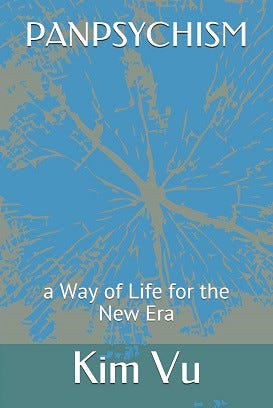“The mycorrhiza structures [between tree roots and fungi] allow for a complex system of egalitarian redistribution.” — Philip Goff (in Galileo’s Error)

This essay is an account of Professor Philip Goff’s philosophical and political interpretations of the experiments and research on plants carried out by the ecologists Professor Monica Gagliano and Professor Suzanne Simard. This means that it won’t be focussing purely on the actual experiments and research — at least not as they’re presented by these scientists. Instead, the focus will be on what Goff philosophically and politically draws out from them.
So it may be the case that Gagliano and Simard have arguments which are more (or less) convincing than Goff’s own. In addition, their experiments may be scientifically kosher and their papers abound with mathematical equations and an infinity of footnotes/references. (Think here of those books by Creationists, Flat-Earthers, New Agers, Deepak Chopra, etc. which often run wild with mathematical equations and technical terms from science.) However, Goff’s interpretations of these experiments are the main theme of this piece.
That said, both of Monica Gagliano and Suzanne Simard do foist philosophical baggage onto their experiments. That philosophical baggage goes way beyond the science itself. Indeed this is a very good example of the common phenomenon of scientists — as well as philosophers and political activists — using scientific data or experiments as ammunition to advance their own political and/or religious/spiritual causes and goals.
To give an an example of that last claim.
In one interview with Monica Gagliano, the interviewer (a Dr Prudence Gibson, who’s clearly very sympathetic) keeps on using the word “radical” in a very positive manner (i.e., about Gagliano’s views). It’s as if she believes that being radical in itself is always and automatically a good thing. (Does being radical also mean being true or correct?) In addition, Gagliano classes (some of?) those who’re critical of her views as being “passive aggressive”. (Some of the people who adopt Gagliano’s views are often passive aggressive against those who reject them.) In addition, apparently Gagliano’s critics are suffering from the (to use the interviewer’s own word) “affliction” of plant blindness. That’s also the case according to those other academics who work in the field of Critical Plant Studies. (CPS seems to more of an idea or project than an actually-existing field of study.)
Philip Goff’s Anthropomorphisms Galore

The main theme in this piece is Goff’s clear anthropomorphism; which he uses to back up his prior panpsychism. The problem is that Goff doesn’t see the words and phrases he uses as examples of anthropomorphism.
For example, in the following Goff will be quoted using the words “associate”, “meaningless”, “preferential treatment”, “for their young”, “mother”, “kin”, “prejudice”, “reciprocal support”, “passing along” “egalitarian redistribution” and “dinnertime” (the last one, surely, is Goff’s joke) to refer to plants.
Perhaps the most extreme example of all is Goff’s use of the word “wisdom”. He uses that word when he says that “mother trees [] pass on their wisdom to the next generation”. Now this is an professional analytic philosopher using the word “wisdom” about trees without even hinting at it being a metaphor or a poeticism. Yet, as stated, that’s because he’s not using the word “wisdom” metaphorically or poetically.
Now it must be said that it’s of course the case that anthropomorphic words and phrases about plants or trees can be — and often are — used poetically and metaphorically, as well as to enable understanding. And, in that simple sense, such uses aren’t truly anthropomorphic at all. So this means that the least a philosopher or scientist can do is make it clear to his/her audience that he/she is using such words (or phrases) in a poetic or metaphorical way. That said, in Philip Goff’s case at least, it’s very clear that he’s not using these word and phrases metaphorically, poetically or to enable understanding: he’s using them literally.
So take this passage as an example of this:
“[W]e now know that plants communicate, learn and remember. I can see no reason other than anthropic prejudice not to ascribe to them a conscious life of their own.”
It’s ironic that Goff mentions “anthropic prejudice” when he himself is clearly indulging in gross forms of anthropomorphism. (Many people have a problem with anthropomorphism even when it comes to animals — never mind plants.)
Readers may now wonder why anthropomorphism is seen to be somehow better than what Goff calls “anthropic prejudice” (i.e., anthropocentrism). Yet don’t both positions share the same (as it were) ánthrōpos (i.e., “human being”) toward plants? And so aren’t both positions equally suspect?
Of course Goff doesn’t believe he’s being at all anthropomorphic.
Ironically enough, I once wrote a piece on the author and theoretical physicist Sabine Hossenfelder and her (seemingly) naive position on panpsychism. (It’s called ‘Sabine Hossenfelder Doesn’t Think… About Panpsychism’.) I now believe that she might have been right to be highly suspicious of panpsychism (even if her arguments are poor) — at least when it comes to Philip Goff and panpsychists with similar views. (She didn’t actually have Philip Goff in mind; at least as far as I know.)
In that piece I stressed that most panpsychists don’t think in terms of electrons (Hossenfelder’s own example) “thinking”, let along “imagining” (see later quotes from Goff). Instead, some panpsychists talk in terms of the very basic phenomenal properties — or even protophenomenal properties — of electrons and other basic entities. Basically, such panpsychists believe that electrons don’t actually think at all; though they do instantiate phenomenal properties.
(Goff now includes spacetime itself in his panpsychism. For example, he writes: “Spacetime on its own is a simple and ubiquitous experience [].”)
So in the following we’ll see the monumental leap from those basic claims of panpsychists to claims about plants “thinking”, “imagining”, etc.
Professor Gagliano’s Experiments on Pea Seedlings

Philip Goff uses highly-selective scientific research on plants as a means to back up and advance his philosophical and political panpsychism.
Firstly, his cites an experiment by Professor Monica Gagliano. Goff writes:
“In order to set up a similar scenario with her pea seedlings, Gagliano put a pea plant at one end of a Y-shaped tube, so that it could grow in either of two directions, left or right. In one direction was the seedling’s ‘food,’ in the form of blue light. In normal circumstances, the pea seedlings will instinctively grow toward where the light was last present. However, Gagliano tested whether the seedlings could associate the sound of a computer fan with the presence of the blue light, by repeatedly placing the noise at the end of the tube where the blue light was located. Upon repeated trials, she found that just as Pavlov’s dogs had salivated at the sound of the bell, so the pea seedlings grew toward the noise of the computer fan. In both cases, a sound that was initially meaningless to the organisms had come to represent dinnertime.”
Firstly and to state the obvious. Plants don’t near to hear sounds or see light. Yet, despite that, they can still be causally affected by both sound and light.
More particularly, isn’t it the case that the seedlings in this experiment would have also been causally affected by the sound of a computer fan? That is, rather than the seedlings
“associat[ing] the sound of a computer fan with the presence of the blue light”
they might have simply been causally effected by the fan sound instead of the blue light.
So where does the supposition of association come from?
In more detail, light is a wave and sound is also a wave — both with very determinate physical natures. Thus the seedlings might have moved toward the computer fan’s sound waves because in many respects they were like the blue light waves. That is, the sound waves of the fan must have causally impacted on the seedlings; just as the light waves had done so previously.
Thus there’s no (immediate) need to talk of “meaning”, “association”, “value”, etc. — as both Goff and Gagliano do.
To repeat: might the sound waves (from the fan) have had a similar causal impact on the seedlings as the (blue) light waves had previously done?
(See the BBC’s ‘Light and sound — reflection and refraction’.)
Goff must also know that even non-biological objects display “movement” in response to their environments. Take the computers and other electronic devices. They change or move in (causal) response to that which is external to them. Yet, oddly enough, Goff himself doesn’t seem to believe that computers are — or even can be — conscious. Indeed he spends some time in Galileo’s Error saying so — if only implicitly. (At the very least, Goff seems to be sympathetic to John Searle’s well-known Chinese Room argument.)
Yet despite focussing on Goff’s panpsychist position on Gagliano’s experiment, it seems that Gagliano herself is a panpsychist… of sorts. (Perhaps that’s why Goff noted her experiments in the first place.) For example, she states (as quoted by Goff) the following:
“‘If the plant is imagining its dinnertime arriving, based on a simple fan that is associated to the light, then who is doing the imagining? Who is thinking here?’”
It’s clear (even if only from Goff’s own words in Galileo’s Error) that Gagliano already had reasons to believe - or hope — that she’d find the results she found. (See Fudge Factor and Experimenter-Expectancy Effect.) After all, she actually set up a (according to Goff) “similar scenario” to Ivan Pavlov’s well-known experiments on dogs in order to see if her pea seedlings would behave in the same — or in a similar — manner to dogs.
Professor’s Simard’s Research on Trees

Philip Goff also uses Suzanne Simard’s scientific research to back up his political and spiritual panpsychism.
Goff writes:
“[H]uman societies social harmony is possible only when they are united by strong ties of kinship. No such prejudice exists among trees. Even across species there exist networks of reciprocal support. In summer, the birch trees help out the fir trees by passing along carbon, especially to the fir trees that are shaded from the sun. In winter, there is reciprocation: when the birches are leafless, the firs provide much needed carbon support.”
It be argued that simply because entities have various causal (non-anthropomorphic) relations with one another, then that alone doesn’t mean that an entity within such a causal web must also display “reciprocal support” toward or “help out” the other entities within that same web.
Take a silicon chip in a computer or a piano string in a piano. Can we use the same kind of anthropomorphic words about these entities within the causal web that is a piano or a computer?
Of course Goff himself is referring to biological entities — trees and pea seedlings; but does that automatically change things in any relevant or fundamental way?
In addition, many animals (never mind trees) “help out” animals from other species for simple reasons of survival — not for reasons of “kinship” or “reciprocal support”. That is:
Animal x carries out action A, which also enables animal z (from another species) to survive, in order to bring about its own (or its species) survival.
And, if anything, the above will be even truer of trees. That is, birch trees “help out” (by “passing along carbon”) fir trees (which, in turn, “provide much needed carbon support” for birch trees) because birch trees gain from such a causal relation. This is the case even if both birch trees and fir trees turn out to be (anthropomorphic) “winners” when such mutual causal interactions occur.
Strangely enough, Goff himself cites evidence which may work against the political values which he extracts from this research. (This may be because Goff was either putting “both sides of the argument” or because he didn’t think through the implications of his own statements.)
The lack of (for want of a better word) altruism in the animal and tree world has just been mentioned. And Goff himself writes that “trees and the fungi enjoy a quid pro quo relationship”. Now would Goff like it if all human relationships were based on such quid pro quo arrangements? Of course no doubt Goff can interpret quid pro quo relationships in the world of trees in a way that squares with his own personal politics — and someone else could interpret it in a way which doesn’t.
That said, Goff then immediately shifts gear and says (of Simard’s research) that
“[t]he mycorrhiza structures allow for a complex system of egalitarian redistribution”.
Of course the words “egalitarian redistribution” are taken from the human political domain. Indeed Goff himself — coincidentally enough — is strongly in favour of egalitarian redistribution in the human world and has written about it in newspapers and in his blog. And here is Goff spotting egalitarian redistribution in the world of trees. (See Goff’s article ‘Our Glastonbury U2 protest was a call for an ethical tax’, written for the Guardian newspaper.)
Goff offers more on Simard’s research which may also be taken to go against his political interpretations of the plant world. He writes:
“[L]ike humans, trees do exhibit preferential treatment for their own young. Simard has shown that the ‘mother’ trees at the center of the network not only give greater amounts of carbon to their own kin, but also send them defense signals which can increase by a factor of four the young trees’ survival chances. This intergenerational transfer is particularly pronounced at the point when the mother trees die, as they pass on their wisdom to the next generation.”
Now since Goff himself mentions human “ties of kinship”, would he be happy with the idea that a specific human being only helps out other human beings because doing so actually helps that said human being? Indeed some theorists have argued that this is indeed always the case with all human beings. However, surely this interpretation wouldn’t please Goff or help his political panpsychism.
Take this other example.
You may think that the fact that “mother trees [] give greater amounts of carbon to their own kin” would work against Goff’s political and spiritual (as it were) holism. Isn’t this example a display of the (to use an anthropomorphic word) selfishness of trees vis-à-vis non-kin? (This all ties into very complex and long-running debates — often political in nature — about whether it’s a self-replicating molecule, gene, cell, organism, group or species that is subject to natural selection — see unit of selection.)
In any case, it can be argued that trees neither give preferential treatment nor don’t give preferential treatment to their “kin” (or, for that matter, to anything else). That’s because phrases like “preferential treatment” seem odd in these non-human (scientific) contexts.
Conclusion

All the above means that Goff uses anthropomorphic ways of speaking even when his examples can be made to work against his political and spiritual panpsychism.
And that highlights a problem here.
Exactly the same data, evidence or experiment about — or on — trees and other plants (as well as animals) can be used as ammunition to advance just about any political position. (See underdetermination of theory by data/evidence.) Indeed, historically, this has often been done. More specifically, talk of “quid pro quo relationship[s]” in the plant world could be used to advance political positions which are diametrically opposed to Goff’s own.
Finally, on the words “wisdom”, “egalitarian”, etc. again — as used by Philip Goff, Gagliano and Simard.
The simple argument here is that Goff, Gagliano and Simard are using these terms in ways that are massively at odds with how they’re used by laypersons when they refer to human individuals, institutions or societies. That is, they’re using them as highly-specific technical terms. What’s more, such technical terms pick out behaviours which are displayed by every member of a plant species — at least in a given environment.
Yet that simply isn’t the case with human beings.
The word “wisdom”, for example, is always used in a relative or contextual way — it’s never used to refer to every human being in all circumstances dating back tens of thousands of years. That is, person, institution or society x is (or was) wise in comparison with other persons, institutions or societies.
As for Goff’s word “egalitarian”: if every plant of a given species is egalitarian, then no plant of that species is egalitarian. Like wisdom, a tree can only be egalitarian if there’s the possibility that this tree (or the entire species) can choose not to be egalitarian. Again: the word “egalitarian” implies that an individual, institution or society chooses to be egalitarian. In other words, the word “egalitarian” has moral or normative content. That isn’t the case with the plant species Goff artfully selects. According to Goff (though he doesn’t explicitly state this), every plant of that species — and perhaps all plants! — are wise or egalitarian.
The same is true of Goff’s use of the words “prejudice” and “reciprocal support” when he refers to plants. Do these plants have the choice to actually embrace prejudice? Do such plants ever go against the reciprocal support Goff highlights? And say that there are indeed some exceptions (which is doubtful — unless for genetic and/or environmental anomalies, etc.) displayed by the plants of a given species — would they be morally flawed to display prejudice or reject reciprocal support?
So what’s the point of using these words at all? They have almost zero connection to how they’re used by laypersons — and probably even by Goff himself when he’s uses them in all other (non-plant-related) contexts.
In conclusion: perhaps it would be wise for Goff not to use the plant world as a weapon in his philosophical and political battles.






No comments:
Post a Comment